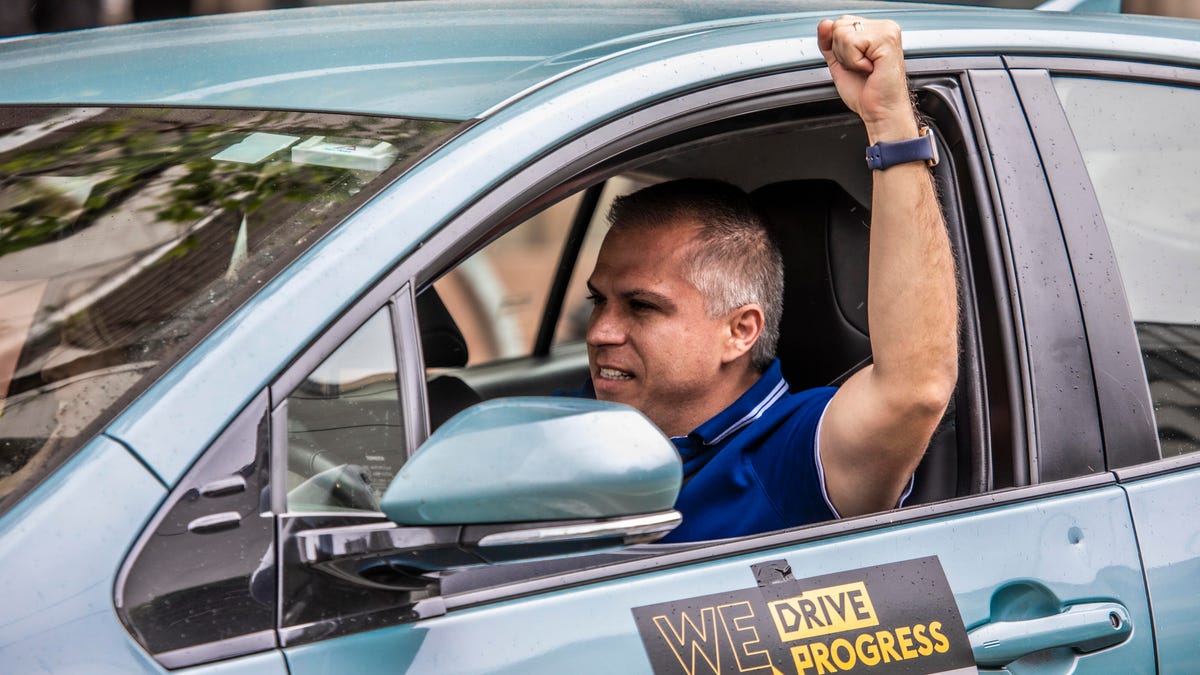Uber and Lyft's win to keep California drivers classified as contractors has national implications
California voters pass Proposition 22, denying gig workers the benefits of full employees -- after gig economy companies spent over $200 million on the campaign.

Uber and Lyft drivers have long rallied to be classified as employees.
California voters on Tuesday passed Proposition 22, a ballot measure backed by Uber, Lyft and other gig economy companies. During the yearlong battle over the initiative, which aimed to exempt the companies from classifying their drivers as employees, millions of dollars have been spent and all sorts of tricks have been pulled from the political playbook.
Proposition 22 is likely to have national implications as other states watch what happens in California, the home of Silicon Valley tech giants. If Proposition 22 had failed, gig economy companies may've been forced to rethink their business models. Now that the ballot measure has passed, companies can use the campaign as a blueprint for similar fights they're waging in other states and countries.
Early polling showed a close race for the ballot measure, with 46% of voters backing the proposition and 42% opposed. The initiative needed 50% of the vote to win. As of Wednesday morning, the bill appeared to have passed with 58% of the vote, according to the California Secretary of State.
Uber, Lyft, DoorDash, Instacart and Postmates contributed more than $205 million to the campaign, with a last-minute $1 million more from Uber on Monday. The No on Proposition 22 campaign was backed with about $19 million from labor groups and unions. The initiative was the most expensive ballot measure campaign in California history and one of the most expensive in US history, according to Ballotpedia.
At stake was whether the gig economy companies would be required to reclassify their workers as employees, as mandated by California law AB5. If classified as employees, workers would get labor benefits, such as health care, sick leave and minimum wage. But the companies said that would add tremendous costs to their businesses. Proposition 22 creates an alternative, in which drivers remain independent contractors and get a few more benefits, like an expense reimbursement and health care subsidy.
The No on Proposition 22 campaign has said that's not enough. It said drivers still might not make minimum wage under the proposition and that the health care subsidy needed to be more substantial, especially during the coronavirus pandemic. When calculating paid time, Proposition 22 only takes into account when workers are on a ride or delivery. It doesn't add in when they're waiting to be matched with a customer.
"Over the past years, Instacart has hired so many new shoppers that I often don't get any orders," Ginger Anne Farr, an Instacart shopper, told Human Rights Watch in a paper released Monday. "I would sit in my car waiting for an order to appear, without making any money."
Final flurry of activity
As Election Day neared on Tuesday, both sides of the Proposition 22 campaign went all in.
Uber, Lyft and the Yes campaign blanketed social media and TV stations with ads, spending a total of $95 million, according to MarketWatch. The gig economy companies also sent in-app messages and emails to riders and drivers asking for their support.
One email Uber sent customers on Monday reminded Californians they could register to vote even on Election Day. It then asked customers to "join the NAACP and California Small Business Association in supporting drivers by voting yes on Prop 22."
The California chapter of the NAACP did endorse the Yes campaign -- that backing came as a small consulting firm run by the chapter's president was paid $85,000 by the campaign. The national branch of the NAACP did not endorse the ballot measure.
The Yes campaign has said drivers prefer to remain independent contractors, often citing "independent studies." Many of those studies were paid for by the gig economy companies or the Yes campaign and others involved informal non-scientific polls. The authors of the studies say their findings are independent and objective.
When asked for comment before the election, Lyft spokeswoman Julie Wood said, "Drivers have consistently said they want to remain independent, and we believe California voters will stand with them."
A spokesman for the Yes campaign reiterated the sentiment. "Drivers are participating in text and phone banking events ... to let voters know that by voting yes they can protect hundreds of thousands of jobs and the app-based services millions rely on," he said.
For its part, the No campaign touted the support of several big-name Democrats, including presidential nominee Joe Biden and his running mate, California Sen. Kamala Harris. Also openly opposing Proposition 22 are Massachusetts Sen. Elizabeth Warren, Vermont Sen. Bernie Sanders, California Rep. Barbara Lee and New York Rep. Alexandria Ocasio-Cortez.
The No campaign additionally coordinated several events across the state leading up to the vote. Drivers opposing the initiative held car caravan protests and dropped "No on Prop 22" banners throughout California's cities. On Monday, California Assemblywoman Lorena Gonzalez, who authored AB5, worked with drivers to reach out to voters by text banking. The campaign said it reached about 10 million voters as of Monday afternoon.
"Rideshare drivers have been building momentum throughout this No on Prop 22 campaign and they are in overdrive mode now, taking their campaign right up to the finish line," Mike Roth, a spokesman for the No campaign, said before the election. "We'll do what it takes to reach every voter we can with the truth."
Uber, DoorDash and Postmates (which Uber acquired in July) didn't respond to requests for comment. Instacart referred CNET to the Yes on Proposition 22 campaign.

